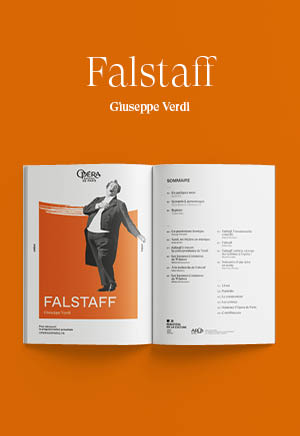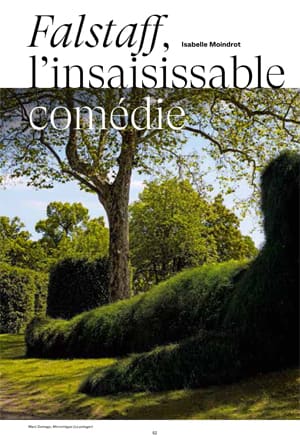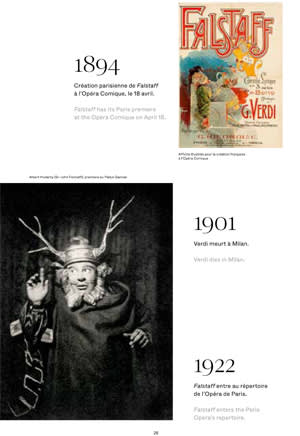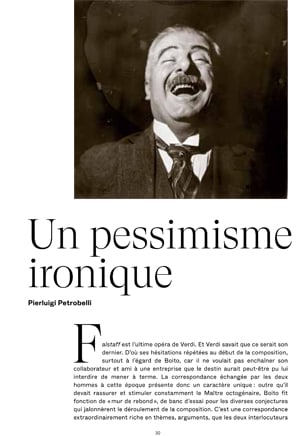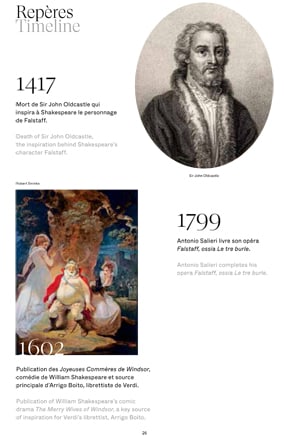Synopsis
Listen to the synopsis
If Falstaff were an animal, he would be a peacock. He plays the beau in front of the Merry Wives of Windsor, convinced, despite his paunch and his age, that he holds them under his spell. He goes so far as to send the same love letter to Mrs Ford and her friend Meg. But beware the women’s revenge, as they will not rest until he repents.
“All the world’s a farce” is the moral of this bittersweet comedy inspired by Shakespeare. In bequeathing this final masterpiece at the age of 80, Verdi displayed his extraordinary vitality and astonishing modernity in his musical structure.
Dominique Pitoiset’s lively, effective staging shifts away from the Elizabethan era to set Falstaff in the bourgeois world of the early 20th century, close to the era of the work’s composition. In so doing, he reveals what undoubtedly moved the composer in this complex but fascinating character: his profound humanity.
Artists
Lyric commedy in three acts (1893)
After The Merry Wives of Windsor and scenes from Henri IV by William Shakespeare
Creative team
Cast
Media


Watch online the recording from season 12/13 on Paris Opera Play, with Ambrogio Maestri, Svetla Vassileva, Gaëlle Arquez, Raúl Giménez...
Access and services
Opéra Bastille
Place de la Bastille
75012 Paris
Public transport
Underground Bastille (lignes 1, 5 et 8), Gare de Lyon (RER)
Bus 29, 69, 76, 86, 87, 91, N01, N02, N11, N16
Calculate my routeCar park
Parking Indigo Opéra Bastille 1 avenue Daumesnil 75012 Paris
Book your spot at a reduced price-
Cloakrooms
Free cloakrooms are at your disposal. The comprehensive list of prohibited items is available here.
-
Bars
Reservation of drinks and light refreshments for the intervals is possible online up to 24 hours prior to your visit, or at the bars before each performance.
-
Parking
You can park your car at the Indigo Opéra Bastille. It is located at 1 avenue Daumesnil, 75012 Paris.
In both our venues, discounted tickets are sold at the box offices from 30 minutes before the show:
- €35 tickets for under-28s, unemployed people (with documentary proof less than 3 months old) and senior citizens over 65 with non-taxable income (proof of tax exemption for the current year required)
- €70 tickets for senior citizens over 65
Get samples of the operas and ballets at the Paris Opera gift shops: programmes, books, recordings, and also stationery, jewellery, shirts, homeware and honey from Paris Opera.
Opéra Bastille
- Open 1h before performances and until performances end
- Get in from within the theatre’s public areas
- For more information: +33 1 40 01 17 82
Online
Opéra Bastille
Place de la Bastille
75012 Paris
Public transport
Underground Bastille (lignes 1, 5 et 8), Gare de Lyon (RER)
Bus 29, 69, 76, 86, 87, 91, N01, N02, N11, N16
Calculate my routeCar park
Parking Indigo Opéra Bastille 1 avenue Daumesnil 75012 Paris
Book your spot at a reduced price-
Cloakrooms
Free cloakrooms are at your disposal. The comprehensive list of prohibited items is available here.
-
Bars
Reservation of drinks and light refreshments for the intervals is possible online up to 24 hours prior to your visit, or at the bars before each performance.
-
Parking
You can park your car at the Indigo Opéra Bastille. It is located at 1 avenue Daumesnil, 75012 Paris.
In both our venues, discounted tickets are sold at the box offices from 30 minutes before the show:
- €35 tickets for under-28s, unemployed people (with documentary proof less than 3 months old) and senior citizens over 65 with non-taxable income (proof of tax exemption for the current year required)
- €70 tickets for senior citizens over 65
Get samples of the operas and ballets at the Paris Opera gift shops: programmes, books, recordings, and also stationery, jewellery, shirts, homeware and honey from Paris Opera.
Opéra Bastille
- Open 1h before performances and until performances end
- Get in from within the theatre’s public areas
- For more information: +33 1 40 01 17 82
Online

Discover opera and ballet in another way

Dive into the Opera world and get insights on opera and pop culture or ballet and cinema. Scan this code to access all the quiz and blindtests on your mobile.

3 min
Falstaff
Falstaff: the true/false story
"Everything in the world is a jest"... Can you untangle this true/false synopsis of Verdi's opera Falstaff? You’re up!
DiscoverYou will also like



























































































